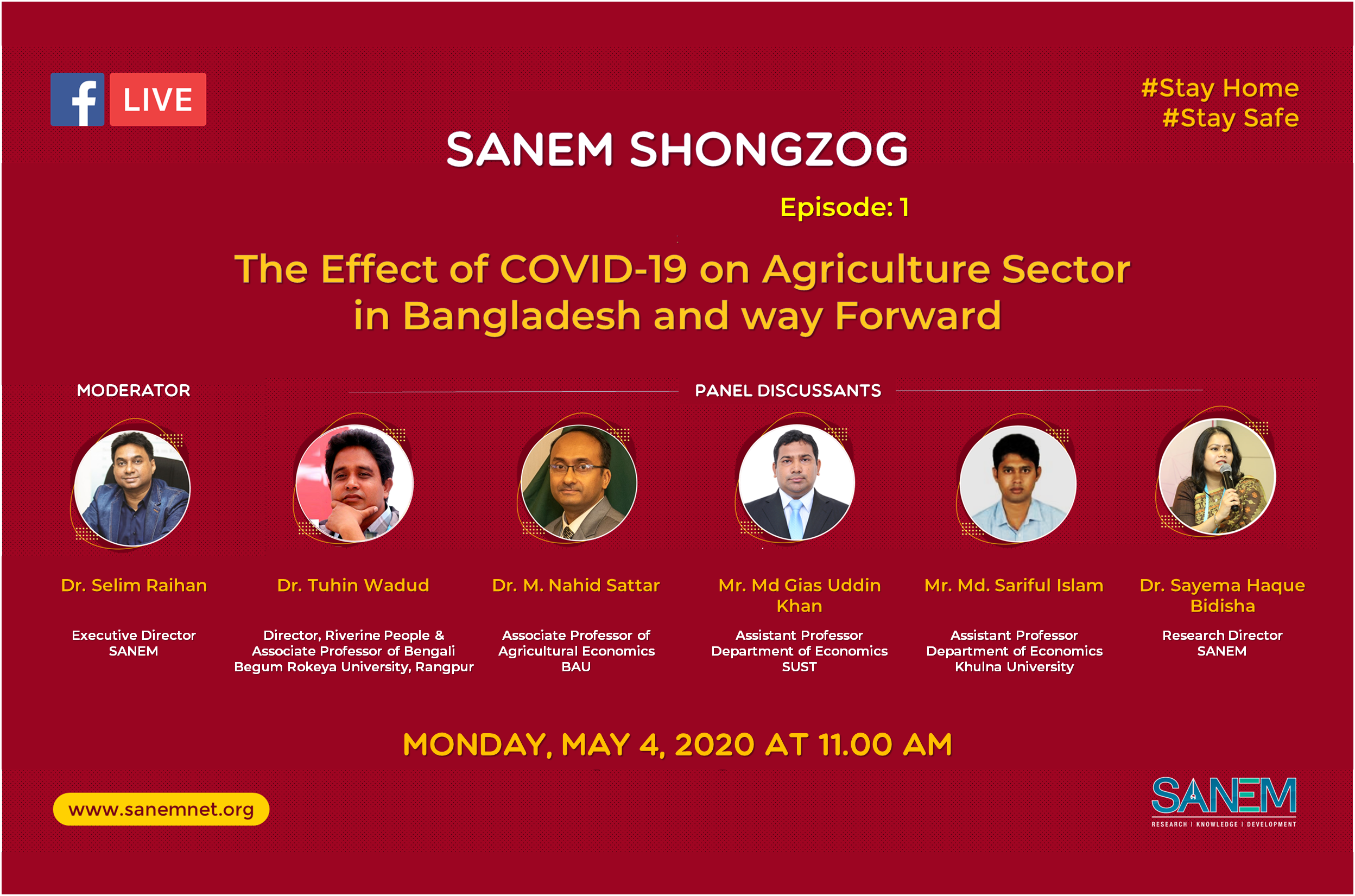SANEM Shongzog | Episode 1
The Effect of COVID-19 on Agriculture Sector in Bangladesh and Way Forward
4 May 2020, Dhaka

South Asian Network on Economic Modeling arranged a series of webinars to create a platform for academicians, researchers, development partners and relevant stakeholders to discuss the economic challenges and solutions regarding the COVID-19 pandemic in Bangladesh. The first webinar was titled as, “The Effect of COVID-19 on Agriculture Sector in Bangladesh and Way Forward”, joined by five distinguished panellists, and moderated by Dr. Selim Raihan, Executive Director, SANEM and Professor, Department of Economics, University of Dhaka. The webinar was livestreamed and attended by interested audience via social networking sites at 11 AM on 4 May, 2020. The panellists were, Dr. Tuhin Wadud, Director, Riverine People and Associate Professor, Department of Bengali, Begum Rokeya University, Rangpur, Dr. M. Nahid Sattar, Associate Professor, Department of Agricultural Economics, Bangladesh Agricultural University, Mr. Md Gias Uddin Khan, Assistant Professor, Department of Economics, Shahjalal University of Science & Technology, Mr. Md. Sariful Islam, Assistant Professor, Department of Economics, Khulna University, Dr. Sayema Haque Bidisha, Research Director, SANEM, and Professor, Department of Economics, University of Dhaka.
Dr. Raihan noted the importance of the agriculture sector in the economy of Bangladesh, including the sub-sectors, such as, crops, poultry, and fisheries etc. while discussing the major issues faced under the present circumstances. Among the issues that were discussed, disruption of production, supply chain, and mobility of agricultural labour were prominent. Furthermore, the sluggish level of mechanization and its reasons, impact of lack of mechanization on productivity, impact of mechanization on the employed population in the agriculture sector were discussed as well. The webinar also discussed the stimulus package announced by Government of Bangladesh for the agriculture sector. Dr. Raihan reiterated SANEM’s position on providing interest-free loans to the farmers and coordinated effort from local to national level to ensure efficient disbursement process. In order to ensure long-term food security, the importance of easily accessible interest-free loans along with relevant assistance for the farmers cannot be overstated. Moreover, Dr. Raihan stated the necessity of establishing sector specific and region specific proper protocol maintaining healthcare guidelines while reopening the production and supply chain of various subsectors of agriculture sector. The coordination among various relevant government organizations such as, Ministry of Agriculture, Ministry of Food, Ministry of Road and Transport etc. need to work together with the farmers, businessman and relevant associations in the local level. Thus, a specific and coordinated monitoring and evaluation mechanism at the local level will ensure efficiency of stimulus package in this sector. Finally, ensuring proper pricing and direct buying of agricultural products at the grass-root level from government using the local administration is immensely important for the small and medium farmers, as the sector has a chronic issue with undervalued price received by the farmers.
Dr. Sattar stated that the market mechanism in the agriculture sector has been weak for a long time in Bangladesh, which has multiplied due to the pandemic. However, lack of agriculture labour was mitigated to a small extent due to the returned labours from industry sector, which might not work as a long term solution and does not guarantee stability in the rice market. He stressed the importance of big data to mitigate impact of future crises in agriculture sector. Dr. Wadud stressed the importance of region specific plan for agriculture sector. Mr. Khan discussed the demand side and supply side shocks in the agriculture sector. Mr. Islam discussed that the timing and reduction of middlemen in the crop buying process by government is very crucial under the present circumstances. Dr. Haque focused on importance of local administration, youth and relevant stakeholders’ coordinated effort to ensure smooth operation of supply chain mechanism of the sector. She welcomed further budgetary allocation for the sector and stressed the importance of assisting the subsectors of agriculture sector which were not beneficiaries of the already pronounced stimulus. The panellists responded to the questions from the attendants of the webinar afterwards.

